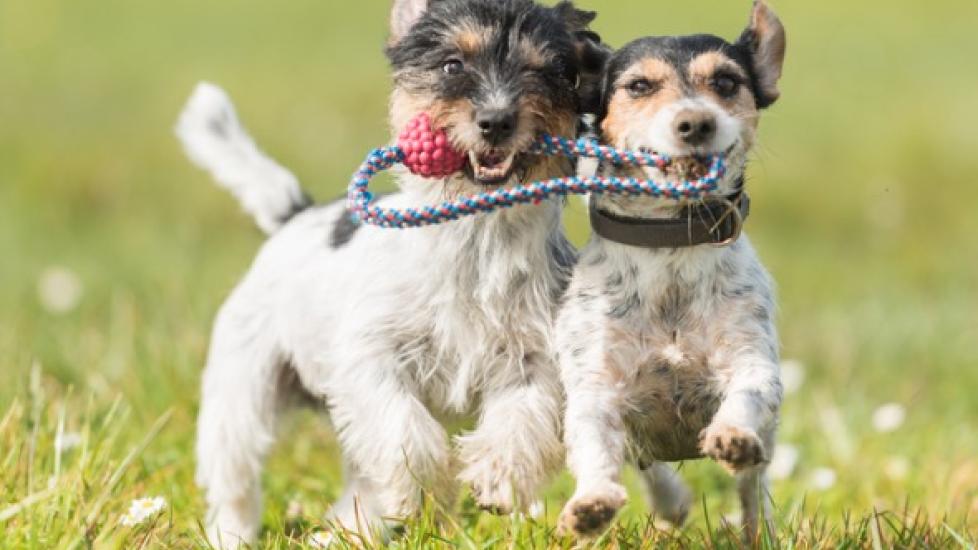Dog Socialization: What to Do When Your Dog Won’t Socialize With Other Dogs
Dogs are social animals, which is why they make good pets. Most people expect their dogs to be friendly toward people and other dogs, but what if the puppy you raised or the adult dog that you recently adopted shows no interest in other dogs? Is it a dog socialization issue? Is this something you need to worry about? Maybe, but maybe not.
It all depends on the body language and behavior your dog exhibits when he is around other dogs. Does he avoid interacting with all dogs? Does he place his ears to the side, lick his lips, look away and move away when another dog approaches? Does he approach and greet other dogs, then move away without interacting beyond that?
Or does your dog bark, growl, snarl or snap at the other dog? This observation of your dog’s behavior and body language around other dogs provides information regarding the underlying motivation of your dog’s avoidance of other dogs.
Is It Okay If Your Dog Doesn’t Interact With Other Dogs?
This all depends on how your dog responds to the presence of other dogs. If you can tell based on your dog’s body language that he appears uncomfortable around other dogs, you should intervene and call him away.
Placing your dog in situations in which he is forced to be around other dogs can cause him to be more stressed and anxious. Imagine how you feel when you are forced to make small talk with total strangers that you have nothing in common with.
As long as you provide your dog with both mental and physical exercise and provide plenty of social interactions with you and other people or animals that he cares about, it can lead a very fulfilling and happy life.
How Does Dog Socialization Work?
Dog socialization is the process of exposing a puppy to members of their own species in order for them to become more interactive. Humans have taken advantage of the socialization period in dogs to expose them to other people, other animals, new environments and experiences.
The best time to socialize a dog is between the ages of 3 and 12 weeks. Sometimes this dog socialization period can extend to 16 to 20 weeks depending on the breed and the individual tolerance of each dog.
During the dog socialization period, the exposure to new people, dogs, environments and experiences should be a pleasant, therefore increasing the chances of the dog wanting to interact with other dogs and people in the future.
Positive exposures when young help decrease a dog’s fear of new places and experiences when he is older. A dog’s temperament develops due the interplay between his genes and the amount of exposure he receives when he was a puppy.
Can You Make Your Dog More Social?
If you have an adult dog that you want to make more social, you need to be sure that this is what your dog wants to do. If your dog appears to be interested in the other dog but then appears uncomfortable after the initial greeting, call him away.
Make a point to carry dog treats so that you can reward him for greeting another dog, helping him to form positive associations with the presence of other dogs. Setting your dog up for some social visits with other calm, well-mannered dogs can be helpful to build up his social skills and learn to become more comfortable around other dogs.
Is There a Bigger Issue?
If your dog is exhibiting signs of fear or aggression, having your dog be around other dogs is not going to resolve the problem. It may make your dog more uncomfortable around other dogs if he does not receive the space that he needs.
With these dogs, you will need the help of a board certified veterinary behaviorist or a certified applied animal behaviorist to evaluate your dog and determine the best course of action. They will recommend a plan of action for you to work with your dog.
Be prepared to face the fact that not all dogs want to interact with other dogs or know how to appropriately interact with them. One of the possible recommendations may be to simply avoid other dogs.
Dogs are like people. Some people are very social, as are some dogs. Some people prefer to be alone or have a limited number of friends they prefer to interact with. Some dogs have similar philosophies. Always allow your dog to have a choice. If he prefers to avoid interacting with other dogs, then respect his wishes.
Featured Image: iStock.com/K_Thalhofer
